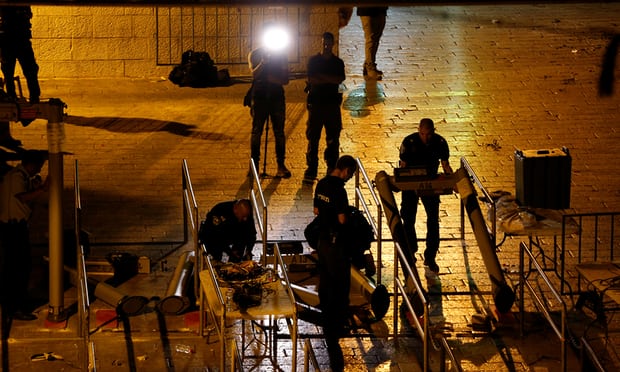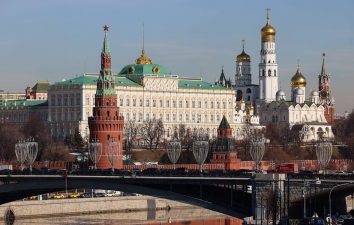
Palestinian protesters outside the Lions Gate entrance to the compound housing al-Aqsa mosque in Jerusalem. Photograph: Guardian.
*Move to dismantle security barriers near al-Aqsa mosque comes after days of violent confrontations that have claimed seven lives
Israel is removing metal detectors from entrances to the compound that houses al-Aqsa mosque.
The move was announced late on Monday night by the office of the Israeli prime minister, Benjamin Netanyahu, and is designed to end a crisis over the holy site. Days of violent confrontations have claimed seven lives.
Despite the Israeli announcement, however, a senior Muslim cleric in Jerusalem said worshippers should stay away from the shrine pending a review of the new Israeli security arrangements there.
Ikrema Sabri, the head of the Supreme Islamic Committee in the city, said such a review may be completed later on Tuesday. Sabri said: “Our position is that for now, nobody should enter” the shrine.
The removal of the detectors on Tuesday appeared to be part of a deal under which Israeli diplomats were repatriated from Jordan, including an embassy security guard who was involved in a fatal shooting of two Jordanians on Sunday night.
…Two killed in shooting at Israeli embassy in Jordan
The brief statement said the Israeli security cabinet, which met on Monday evening, had “accepted the recommendation of all of the security bodies to incorporate security measures based on advanced technologies (‘smart checks’) and other measures instead of metal detectors in order to ensure the security of visitors and worshippers in the Old City and on the Temple Mount”.
The statement added that under the plan Israeli police would “reinforce” their presence around the holy site. It did not say when the metal detectors would be removed or what would replace them. Israeli media earlier reported that high-resolution cameras capable of detecting hidden objects would be the alternative.
Earlier on Monday the UN’s Middle East envoy warned of the dangers of allowing the crisis to continue. “It is extremely important that a solution to the current crisis be found by Friday this week,” Nickolay Mladenov said after briefing the UN security council. “The dangers on the ground will escalate if we go through another cycle of Friday prayer without a resolution.”
He said events in east Jerusalem were not “localised” but “affect millions if not billions of people around the world”.
Even before the Israeli decision to remove the devices, it was unclear whether such a move would be sufficient to end the violence. Muslim religious officials – who allege Israel is trying to expand its control at the site – said they would accept only a return to the arrangements for access to the compound that had been in place before an incident on 14 Julywhen two Israeli policemen were shot by three Israeli Arab gunmen who had smuggled weapons on to the site.
“This movement is a movement of the street,” said Sheikh Raed Dana of the waqf, the Islamic endowments organisation that administers the mosque compound, commenting on whether he believed worshippers should end protests and return to the shrine. “We as the waqf listen to the street. The street says yes and we say yes; if the street says no to the measures, we will say no.”
There has been increasing criticism of the way the metal detectors were installed, without consultation with the waqf and reportedly over the objections of senior Israeli security officials who had warned of the risk of bloodshed.
On Monday night Israeli diplomats were evacuated from the embassy in the Jordanian capital, Amman, after Sunday’s shooting of two Jordanians by a security guard.
The diplomats, including Israel’s ambassador to Jordan, Einat Schlain, crossed the Allenby bridge border in a convoy, arriving back in Israel at around 11pm. Among those repatriated were the security guard whom Jordan had originally said it wanted to retain for questioning over the incident.
A Jordanian news site linked to the kingdom’s military said investigators had determined that the altercation at the embassy compound was not politically motivated and that one of the Jordanians, a 17-year-old, had attacked the guard with a screwdriver in a dispute about a furniture delivery.
Under an agreement negotiated by the head of Israel’s domestic security service, who had been sent to Amman to negotiate, Israel agreed that Jordanian police could hear the guard’s description of the incident in the presence of Israeli diplomats.
Netanyahu’s office said the return of the diplomats had been made possible “thanks to close cooperation which was held in the past day between Israel and Jordan”.




